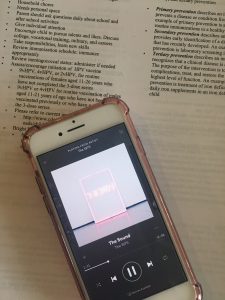
Music, in its most basic form has five components: dynamics, rhythm, melody, harmony, timbre, form, and texture. Individually, each component may not seem like much, in fact, it may be quite boring. However, when combined these components create a plethora of diverse music, from pop to metal and they all sound incredibly different. It’s no surprise that these simple components can have a large effect on the brain as well.
Studies show that listening to music increases dopamine. Dopamine is a neurotransmitter that promotes feelings of pleasure. Infact, when a person’s favorite song is played, they have a small dopamine boost. This means that by listening to music, our mood is positively increased. It is also found that music promotes prosocial behavior. Prosocial behavior is behavior that promotes thing such as donating and volunteering. Many volunteer places such as Clean the World play music while volunteers engage in activities. This helps people be more willing to volunteer again. Specific songs that contain lyrics of helpfulness and kindness such as One Love by Bob Marley and Imagine by John Lennon promote an even greater amount of prosocial behavior.
According to a study done by Stanford University, music in general “engages the areas of the brain involved with paying attention, and updating the event in memory.” This means that music can help teenagers focus more on the task at hand. Junior Abbie Brown often listens to music when she does homework, “I like to listen to a lot of music, but mainly alternative and 80’s music. If I don’t listen to music when I do homework I would most likely fall asleep.” Brown also believes that teachers should allow students to listen to music when doing independent assignments, “Some classes are loud or there are a lot of disruptions so listening to music helps me tune those noises out.”
